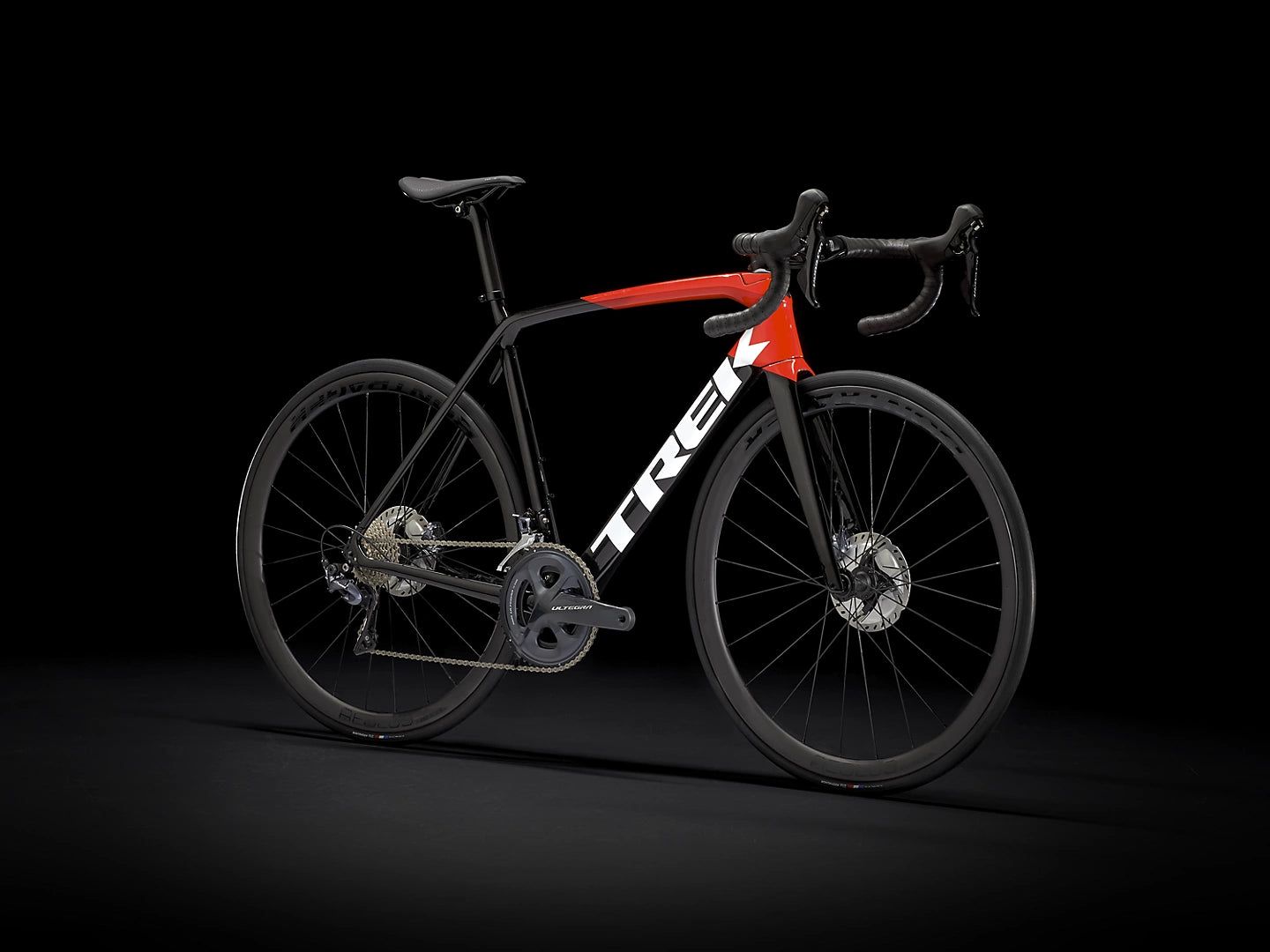2022 Trek Emonda Size Guide
The following chart provides a rule of thumb approach to determine your bike size based on your height. This is a simple approach to a complex situation, but it is accurate in the majority of cases. Of course, the length of your limbs is not factored into the table below and long or short limbs or torso can play a big role in determining the right bike size for you.
In addition your riding style can influence your choice; if you like a more aggressive bike, you may prefer a smaller frame; if you prefer a more upright position, you may prefer a large frame. If you are 'between sizes', give this consideration when making your selection.
The 2022Trek Emonda is produced in sizes 47, 50, 52, 54, 56, 58, 60, 62
TREK EMONDA SIZE GUIDE
-
YOUR IMPERIAL / METRIC HEIGHT
4' 11" /150 cm
5' 0" /152.5 cm
5' 1" /155 cm
5' 2" /157.5 cm
5' 3" /160 cm
5' 4" /162.5 cm
5' 5" /165 cm
5' 6" /167.6 cm
5' 7" /170 cm
5' 8" /172.7 cm
5' 9" /175.2 cm
5' 10" /178 cm
5' 11" /180cm
6' 0" /182.8 cm
6' 1" /185.4 cm
6' 2" /187.9cm
6' 3" /190.5 cm
6' 4" /193 cm
6' 5" /195.5 cm
-
2022 TREK EMONDA ROAD BIKE SIZE
Size - 47
Size - 47
Size - 47
Size - 47 / 50
Size - 50
Size - 50 / 52
Size - 52
Size - 52 / 54
Size - 54
Size - 54
Size - 54 / 56
Size - 56
Size - 58 / 58
Size - 58
Size - 58/60
Size - 60
Size - 60 / 62
Size - 62
Size - 62
3 FUNDAMENTALS OF CORRECT BIKE SIZE - TREK EMONDA
Before you purchase your 2022 Trek Emonda road bike, you need to ensure the frame meets 3 basic size requirements: stand-over, reach, seat height.
1. STAND-OVER
No dimension is more important than Stand-over. But what is stand-over you ask?
Stand-over is the measurement of the height of the bikes top-tube from the ground at its midpoint.
Ok, so why is it so important? Simply put, if you are travelling along on your bike and you need to stop in a hurry, you'll have to jump forward, landing on the ground, standing with your legs on each side of the top tube. Having the correct Stand-over will ensure you do not impact your groin area during this situation.
How to test it.
When you stand-over the midpoint of the bike, with shoes on, you should be able to lift the bike up until there is a 2 cm gap between the tyres and the floor - without the frame coming in contact with your groin.
If you are looking at the best size option based on a geometry chart, measure from inner leg to floor (with shoes on), remove 2cm and test that measurement against the bikes geometry chart. For the Trek Emonda, this is measurement L in the Geometry diagram below.
2. REACH
Get this one wrong, and you may be in for a world of back pain. Whether that is upper or lower back pain will depend on whether you buy, or are sold, a bike that is too big or too small for you. Buy the correct size bike and your hours of saddle time will actually strengthen your core and back, not hinder it.
The Reach is the distance your hands project forward to comfortably rest on bars and manipulate the brakes and gears.
How to test it.
The quickest test of correct reach is to sit in the correct riding position on the bike (a trainer is great for this or if that is available, take the bike for a quick ride or balance against a wall with someone's assistance).
Sit on the bike in a neutral position with your hands resting on the hoods (illustrated above) and your head in a natural riding position - eyes looking forward. Now look down at the front wheel hub/axel. If the position is correct the bars should block your view of the hub/axel. If you can see the hub/axel in-front of the bars, the bike is too small. If you can see the hub/axel behind the bars, the bike is too large.
Stem length obviously plays a role here. However, if you are buying a bike from a store, it should be equipped with the correct size stem for the frame. Ideally, you should only have to swap stems if you have a particularly long or short torso.
Your saddle can be moved forward or back on the 'rails' to make small adjustments to your reach outcome. If the bike is the correct size for you, you should not have to move it all the way forward or all the way back.
3. SEAT HEIGHT
Seat height impacts on comfort and performance - correct seat height optimises both. Your seat needs to allow for an efficient and powerful pedal stroke while maintaining you in a balanced, static and comfortable seated position.
It is also important to note that your seat needs to be in the correct position to properly determine your reach (above).
How to test it.
This is a simple and quick way to ensure a powerful and efficient seat height position. Sitting on your bike, rest your heal on your pedal when it is in the lowest (6 O'clock) position.
You need to check two things now and you will need another person to assist with this. Check that your leg is fully and comfortably extended. At the same time, when viewed from behind, your hips should be level. If required, adjust the seat height to achieve the ideal balance of full leg extension and level hip placement. When this is resolved, returning you foot the usual cleated cycling position should achieve the correct amount of knee bend.
ONE EXTRA! - BAR DROP
The position of the bars relative to the seat. This is the bike fit positioning that can cause a lot of trouble and one that we recommend determining over time and with the assistance of a professional bike fitter.
If you are new to cycling with average fitness and flexibility, err on the side of positioning your bars at the top of the steerer with one spacer above the stem. This will allow options to lower the bars over time as your fitness, flexibility and riding continue to evolve.
Does this position influence which size bike to purchase? That should be a secondary consideration after first determining which frame geometry is appropriate for you. If your flexibility is limited (or not what it used to be), you may be best to consider a frame with endurance geometry to ensure a higher front end and a more relaxed position on the bike.
TREK EMONDA GEOMETRY DIAGRAM
TREK EMONDA GEOMETRY CHART
COMPARE YOUR OWN BIKE
If you already own a road bike and are happy with the fit. It is good to know you bike fit basics by measuring your seat height, reach, and bar drop.
Seat Height - Your seat height is the distance from the centre of the bottom bracket to top of the saddle when running the tape parallel to the seat post. See the line in the diagram above.
Bar Reach - The distance from the front tip of saddle to centre of the bars (where the stem cap contacts with the stem). Keep the tape running parallel to ground. See the line in the diagram above.
Bar Drop - The handlebar drop is the distance from the centre of the bars to the centre of the hub. See the line in the diagram above.
Once you have these recorded, you can then quickly check how your bike setup will work with the bike you are test riding, renting or just throwing a leg over in a store.

About Livelo
Livelo doesn't sell new road bikes, we rent them is over 40 cities. We work with a lot of the major bike brands across our global road bike rental business. We assist thousands of our clients to get set up on bikes each year, and are experts on getting your bike fit right.
We know there are lots of great bikes available in todays market, but getting that one that is just right for you is a complex. You have to satisfy the body, the head and the heart.
We are happy to give you some unbiased advice on your road bike needs. We won't be trying to sell you a bike, we will be trying to be helpful. You can contact us here if you would like to talk bikes.





